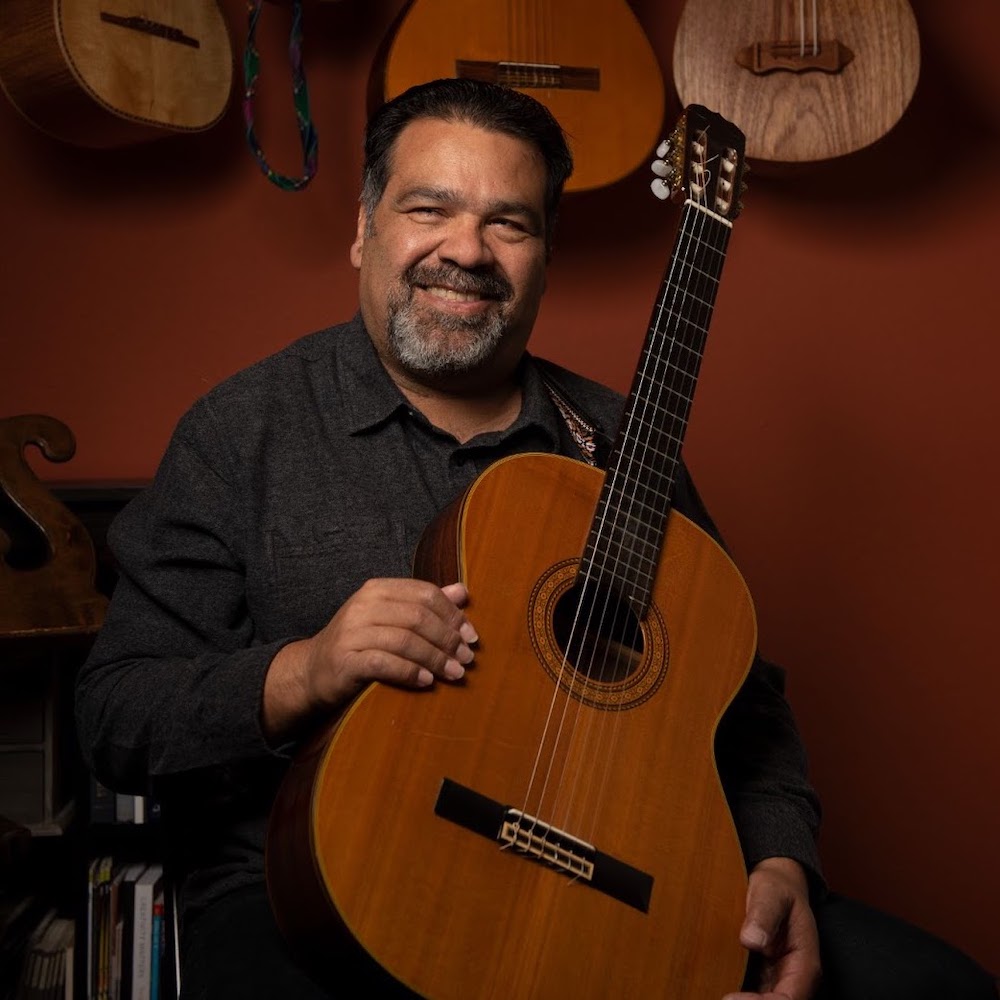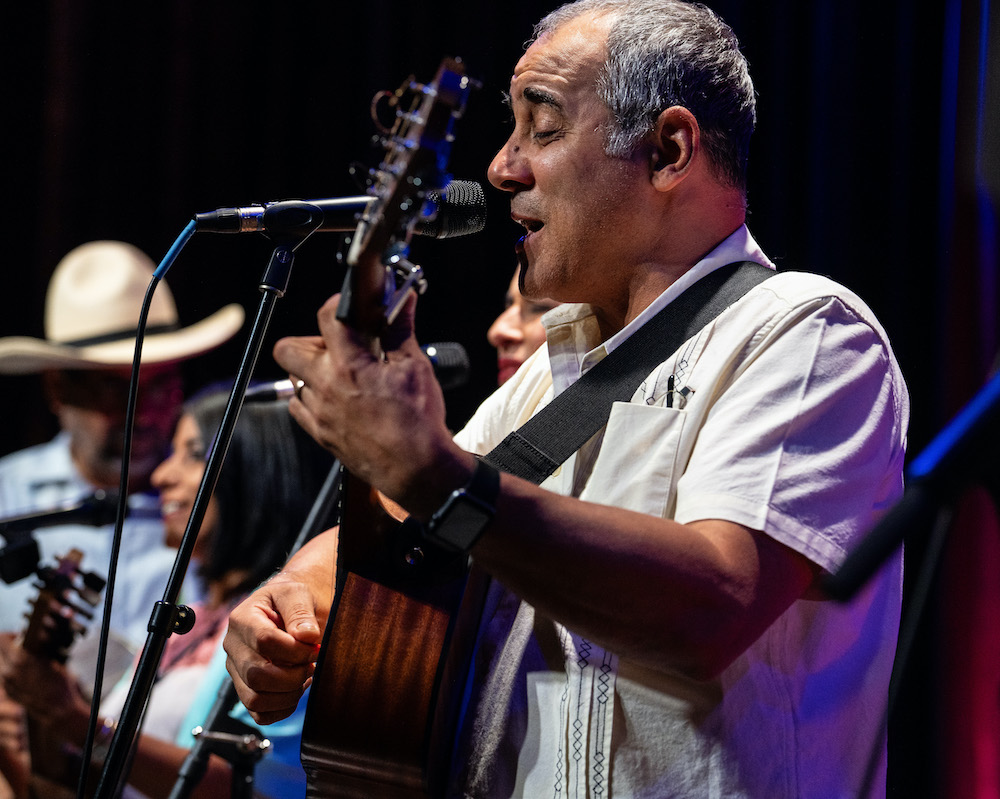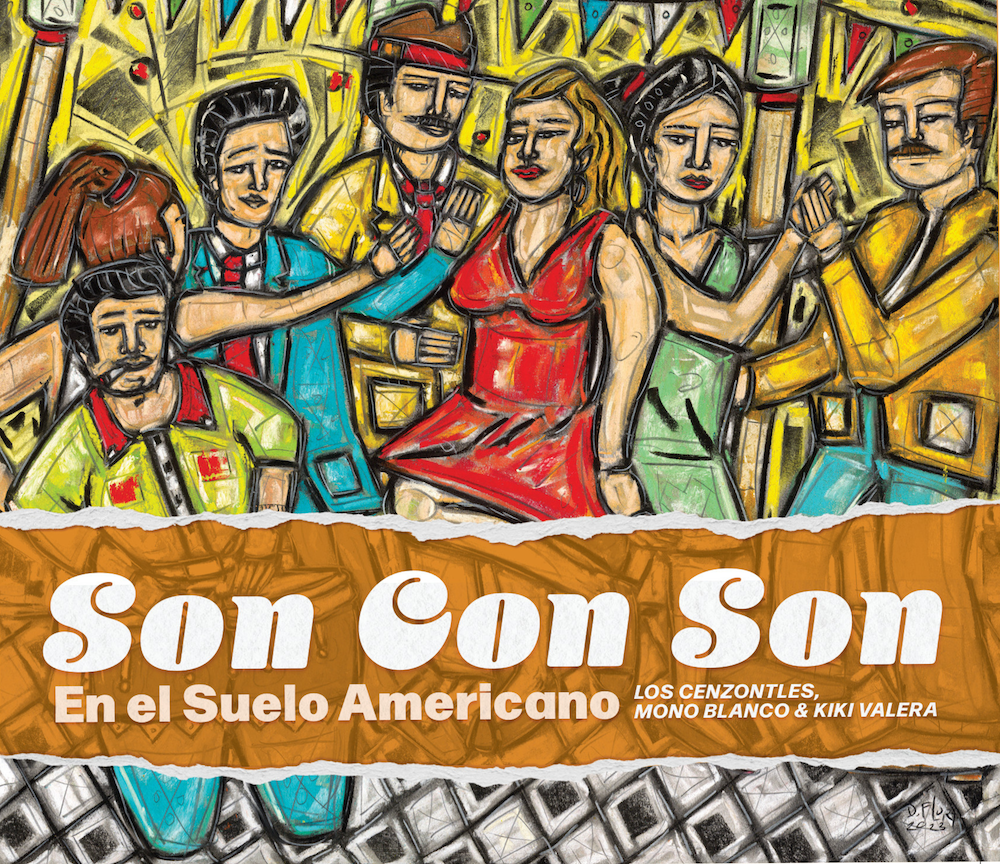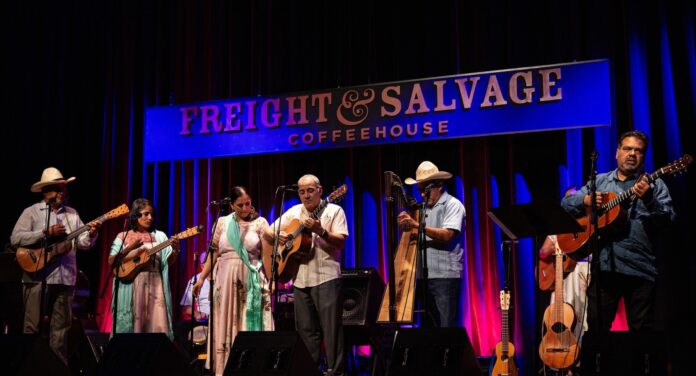On Son Con Son, en el Suelo Americano, the latest release from community music organization Los Cenzontles, Santiago de Cuba multi-instrumentalist Kiki Valera and Veracruzan group Mono Blanco give birth to 11 highly danceable, occasionally autobiographical tracks that will thrill fans of traditional sound. In fact, the songs are an innovative fusion of son cubano and Mexican son jarocho. But the collaboration is not unprecedented in their international connection, says Los Cenzontles founder Eugene Rodríguez.
“Mexico and Cuba have a centuries old love affair,” Rodríguez explains in an email interview with 48hills. “When Los Cenzontles toured Cuba in 2016 we saw this first hand. We saw Cuban singers dressed in mariachi charro outfits singing Mexican rancheras. We saw Cuban children dancing Mexican folk dances.”
Rodríguez’s educational organization, whose youth group was founded in San Pablo in 1987, has remained dedicated to a multivariant mission to honor folk music traditions. These days, Los Cenzontles hosts classes for kids beginning as young as four years old, its musicians of all ages play for the community in vibrant live events like its Son Jarocho Festival—and it even ventures into soundtracking Californian history. At the core of its programming is providing space to musicians to explore time-honored sounds.
Case in point: the Valera-Mono Blanco release was born out of another Los Cenzontles-sponsored Mexico-Cuban linkup, and inspired in part by Veracruz artist Gilberto Gutiérrez’s successful three-month residency at the community group earlier this year.
“In 1995 I co-produced an album called Se Acaba el Mundo (The World is Ending) that featured son con son with Grupo Mono Blanco and many world music practitioner friends of mine who we called Stonelips,” says Rodríguez. “The album was innovative and influential. So this this new iteration was a follow up, but also refreshed.”
“I had seen videos of Kiki Valera’s family band, Valera Miranda, on YouTube and was very much taken by their traditionality and quality,” he continues.

Cuba and Mexico have long enjoyed a close relationship, which was solidified when Fidel Castro and Che Guevara took refuge in the latter country to plan the Cuban Revolution. (Look no further than the seated statues of Che and Fidel in Mexico City’s Plaza San Carlos, in the capital’s Tabacalera neighborhood where the two first met, for proof of CDMX’s continuing pride in this historic chapter.) Indeed, Mexico’s official stance of “political neutrality” when it comes to international political conflict was established during the Cold War, in part to avoid taking sides in the mounting aggression between monied neighbor United States and Mexico’s island comrade.
Over the years, musical collaborations between Cuban and Mexican artists have showed dizzying variety. In 2020, Cuban reggaeton duo Gente De Zona linked with Mexican regional singer Gerardo Ortiz to bring back the urbano-banda fusion trend with the perreo-powered bolero “Otra Botella.” (Latin trap superstar Bad Bunny’s recent forays into the genres notwithstanding, Mexican regional artists have been flirting with so-called “urban” genres since Los Tigres del Norte’s 1991 “Rap Norteño.”)

But in Son Con Son, En El Suelo Americano lies an explanation of precisely how deep the two countries’ connection can get. Mono Blanco and Kiki Valera are widely known for their mastery in son jarocho and son cubano, respectively. The family of son genres comes from a cultural melting pot of influences—one can hear notes of Spanish flamenco and Andalusian folk music in both strains. Perhaps most importantly, son sprung from African musical legacies, a melodious reminder of the seminal cultural influence of enslaved Black communities on countries around the Gulf of Mexico.
Drawing as it does on shared history, Son Con Son may require an educated ear to precisely identify its musical innovation. A theorist could get into rhythmic variations between son subgenres, but perhaps they are most easily expressed by the diversity of musical instruments spread among different types of son. Cuban bongo, clave congas, and guiro weave with the traditional Veracruzan instruments of the jarana, pandero, quijada, and requinto on Son Con Son. The result is a joyous affair, with its artists seemingly reveling in the possibilities afforded by their pairing—including the chance to tell a shared story of movement and music, as in the meta track “El Suelo Americano.”
Valera and Mono Blanco teamed with a host of Los Cenzontles players, singers, and dancers for a jubilant live performance of many of the Son Con Son songs days after the album was completed, at Freight & Salvage in July. Rodríguez says that they hope to find another chance to perform the songs for a live audience.

You don’t have to wait for that hypothetical date to support the release. Son Con Son is now available for purchase in CD and streaming formats. And given the fundraising flux in which Los Cenzontles finds itself after the height of the COVID pandemic, sending some cash their way would not be a bad idea for supports of youth music education.
Despite the music school’s bold decision to drop online class fees when the pandemic began in earnest in 2020, three years of students were unable to properly enter the Los Cenzontles program. That’s a problem, since Rodríguez says that many youngsters who enter as young as four year olds continue in classes through high school.
So that process was interrupted,” he says. “We are trying to support the new generation of youngsters, many of whom need help with socialization.”
And that’s not the only challenge that’s being faced.
“During the pandemic philanthropy was very supportive of the cultural arts,” says Rodríguez. “That seems to have changed dramatically and so we are facing our first budget deficit in over a decade.”
There’s no denying that the world is in need of all the connection it can get—including, in cross-cultural music-making. Might be a good time to make plans to attend one of the organization’s events—like its November 4 Día de los Muertos gathering—or to drop anything you can spare in the Los Cenzontles proverbial guitar case.
Buy Son Con Son, en el Suelo Americano here, and stream it here. Support Los Cenzontles’ community music education with a donation here.







